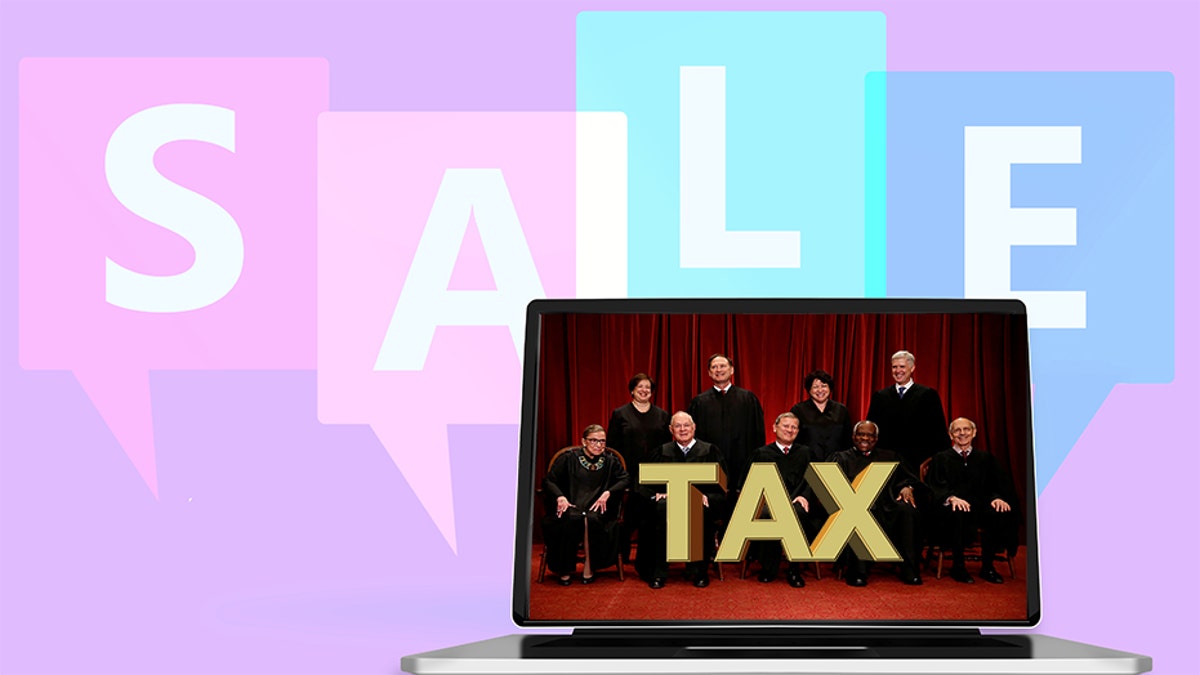
Computer Screen Illustration (iStock/Reuters)
Online shoppers may find their purchases will cost more if the Supreme Court does away with a decades-old ruling limiting the ability of states to collect sales taxes on out-of-state internet purchases.
But several justices, in an intense hour of oral arguments on Tuesday, expressed concern about overturning its precedent, despite the fact it was decided before the digital age. Some on the bench said Congress' refusal over the years to act on its own was a sign the status quo should be preserved.
A coalition of small business owners, including many who offer their online goods from home offices, say their profits would evaporate if forced to comply with complex tax rules in all 50 states.
But a majority of states say they are losing billions in revenue, and they are supported by many large so-called brick-and-mortar retailers like Wal-Mart that do pay sales taxes, regardless of whether their sales are done in stores or online.
The stakes could be huge, since consumers now make about 10 percent of their purchases online
"E-commerce is expanding, and companies like Amazon account for a large part of that. But they're already collecting in all 50 states. And that's the problem. It's not that e-commerce is expanding," said Chief Justice John Roberts, questioning the states' arguments. "The problem you have to address is that the coverage in terms of collecting the taxes is expanding as well."
"It's not that e-commerce is expanding. The problem you have to address is that the coverage in terms of collecting the taxes is expanding as well."
Some on the bench suggested leveling the playing field for all retailers.
"The assertion is that asking an out-of-state seller to collect tax on goods shipped in-state discriminates against interstate commerce," said Justice Ruth Bader Ginsburg. "But, as I see it, why isn't it, far from discriminating, equalizing sellers; that is, anyone who wants to sell in-state, whether an in-state shop, an out-of-state shop, everybody is treated to the same tax collection obligation."
State Dakota is leading the legal charge, passing a law requiring the collection of sales tax on internet vendors with at least 200 yearly transactions or $100,000 in sales to its residents.
Forty-one states back the effort, saying the problem is growing worse as e-commerce continues to grow nationwide. They argue tax collection software makes it easier for retailers big and small to comply with their tax obligations, which vary widely from state to state, and product to product.
But many online sellers, such as Etsy or EBay, that serve as a third party portal for thousands of small homegrown businesses that do not pay sales taxes, point to confusing tax rules that could expose them to costly audits for any revenue shortfall.
As an example, lawyers for the online retailers point out that in Illinois, a Snickers bar costs more in taxes than a Twix bar, since food items containing flour are not treated as candy for tax purposes. Customers in most cases are supposed to pay the tax themselves, but both sides of the debate admit few actually do.
Amazon, by far the nation's largest online seller, is not a party to the case, since it now has a physical presence in many states, with warehouses, and pay the taxes.
The high court for more than 50 years in various rulings has said states cannot collect taxes from sellers without a "physical presence" in those states. That precedent was preserved in a key 1992 ruling. Congress two decades ago exempted most online sellers. But as the e-commerce platform has evolved, more of the larger online retailers have begun paying sales taxes-- about 90 percent of the revenue owed.
In arguments, the justices struggled to reach any consensus. Unusual coalitions seemed to develop between justices typically on either end of the ideological spectrum.
"What happens when the tax program breaks down, as it already has for the states who are using it, and merchants can't keep track of who they've sold to? All of these are questions that are wrought with difficulties," said Justice Sonia Sotomayor, who seemed to have the backing of Roberts. "So you're introducing now a whole new set of difficulties to put behind something that's been in place for 30 years now?"
Sotomayor wore a sling on the bench for the public argument session, after breaking her left shoulder in a fall at home on Monday. A court spokeswoman said the 63-year-old Sotomayor would begin physical therapy and was not expected to miss any work.
Justice Neil Gorsuch reiterated Ginsburg's comments that interstate commerce might be threatened by tax exemptions sought by many small retailers.
"Brick-and-mortar retailers, if they choose to operate in any given [tax] jurisdiction, have to comply with that jurisdiction. There are a lot of retailers that have to comply with lots of different jurisdictions' rules," he said. "Why should we favor, this Court favor, a particular business model that relies not on brick and mortar but on mail order?" He said those views governing a physical presence in order to collect taxes "seem a little antiquated today."
After arguments, South Dakota's Attorney General Marty Jackley argued for a level playing field for states.
"Main Street businesses are at a pricing disadvantage," he said outside the court. "That's not fair, that's not right, and that should not be constitutionally sanctioned.
But one small retailer complained many states were engaging in "bullying tactics" with their tax requirements. Kathy Terrill, who sells women's clothing and Broadway memorabilia, said the financial burdens could put her out of business.
"What will happen is sales tax becomes weaponized against small online sellers like myself. It is in effect taxation without representation," she said.
The case is South Dakota v. Wayfair (17-494). A ruling is expected by late June.




